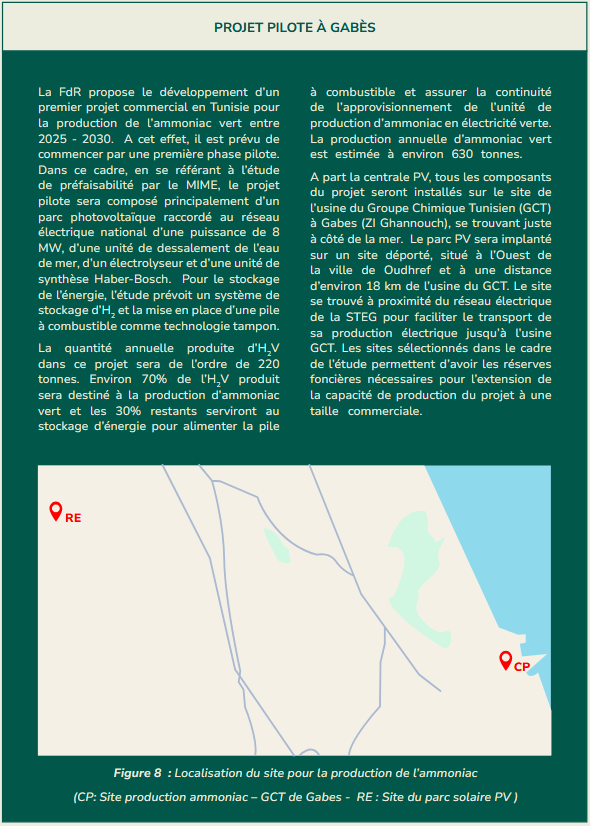Tunisia’s hydrogen roadmap: renewable ammonia production by 2025
By Julian Atchison on August 07, 2024
Pilot project on Mediterranean coast: ammonia for fertiliser

Click to enlarge. The proposed pilot project at Gabes, which will produce renewable ammonia for fertilisers in Tunisia. Fig 8 from Stratégie Nationale pour le développement de l’Hydrogène Vert et de ses dérivés en Tunisie (Tunisian Ministry of Industry, Mines and Energy, May 2024).
Tunisia’s Ministry of Industry, Mines and Energy has launched a national roadmap for hydrogen (Feuille de Route or FdR in French), laying down a pathway to significant exports by 2050. Developed in partnership with the German Agency for International Cooperation (GIZ), the roadmap aims for 8.3 million tons of hydrogen production per year in Tunisia by 2050, with 6 million tons of that exported to Europe by pipeline. A little over 2 million tons will be available for the local market (including fertiliser production), and for the production of derivatives (including methanol and ammonia) for export. From 5 GW of installed renewable energy capacity in 2030 (and almost none today), the Tunisian government is targeting 100 GW of installed capacity in 2050.
As part of the first steps, a commercial pilot project in Gabes on Tunisia’s Mediterranean coast will produce electrolytic hydrogen and ammonia between 2025 and 2030. A solar-fed electrolysis facility will eventually produce 220 tons of hydrogen per year, with about 30% of this volume to be stored and used by a fuel cell for backup power. The annual renewable ammonia production at Gabes will scale to 630 tons. The project also features 8 MW of solar panels (early phase), further backup via grid connection and a desalination plant. Except for the solar plant, all infrastructure will be deployed at the site of the Tunisian Chemical Group. Land for project expansion has already been set aside.
Currently, Tunisia imports all of its ammonia for fertiliser production. At Gabes, the Tunisian Chemical Group intends to use renewable ammonia from the pilot project for domestic fertiliser production, mainly DAP and MAP. The roadmap also notes the strong potential of ammonia and methanol maritime fuel in Tunisia, given its location and the number of vessels passing its coastline. In terms of financial incentives and de-risking policies, the government is looking towards policy frameworks such as those implemented in Egypt, which features simplification of project approval steps and tax exemptions.